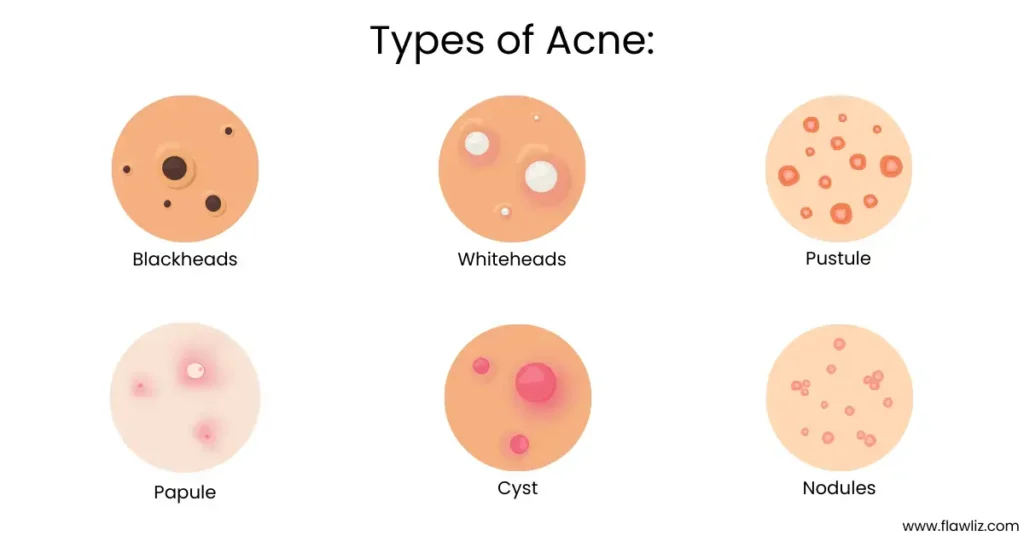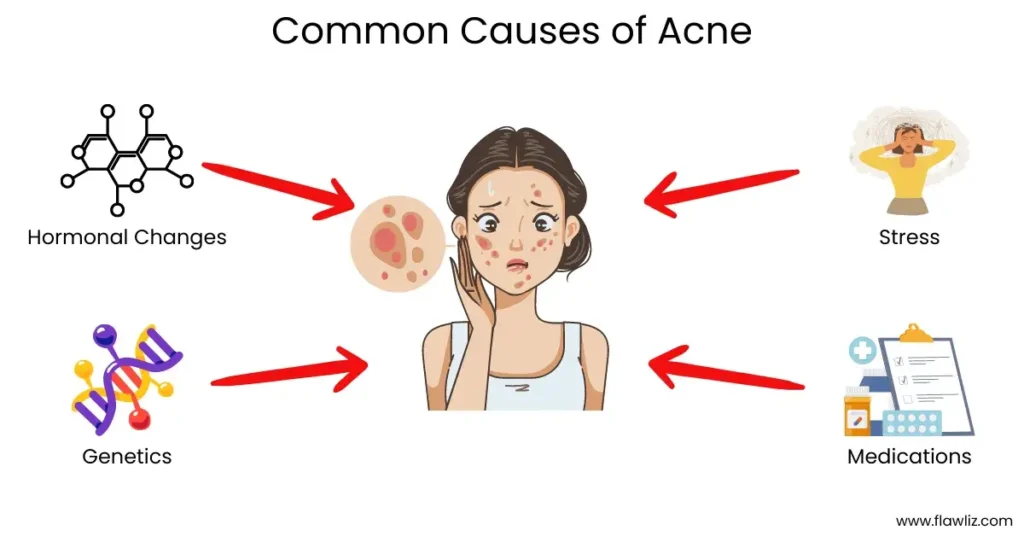Struggling with acne and concerned that your almond milk consumption might be exacerbating your skin problems? Rest assured, you’re in good company. As almond milk gains popularity as a dairy substitute, there’s an increasing concern that it might negatively impact your skin’s health.
In this article, we’ll cut to the chase. We’ll break down what’s in almond milk, get into the science of acne, and lay out the findings from studies digging into the almond milk acne connection.
Table of Contents
Does Almond Milk Cause Acne?
There is no conclusive proof that almond milk causes acne.
However, some people may experience breakouts as a result of the higher levels of omega-6 fatty acids in almond milk. Furthermore, almonds, along with dairy, gluten, and soy, are among the top food acne triggers.
As a result, those with oily skin or a history of hormonal imbalance may be more prone to breakouts after consuming almond milk.
Understanding Acne
Acne is a skin condition that occurs when hair follicles become clogged with oil and dead skin cells. This leads to the formation of pimples, blackheads, and whiteheads on the skin.

Acne is most commonly found on the face, neck, back, and chest. It can affect people of all ages and skin types, but it is most commonly found in adolescents and young adults.
The exact causes of acne are not fully understood, but it is believed to be a combination of several factors including genetics, hormones, diet, stress, and skincare products.
Hormonal changes, such as those that occur during puberty or pregnancy, can cause an increase in oil production and lead to the development of acne.
Similarly, consuming a diet high in sugar, dairy, and processed foods has also been linked to acne. Stress can also trigger the release of hormones that contribute to the development of acne.

In addition to these factors, certain skincare products can also contribute to the development of acne. Ingredients such as fragrances, alcohol, and mineral oil can clog pores and lead to the formation of acne.
Therefore, it is important to choose skincare products carefully and avoid those that may trigger or worsen acne.
What the Research Suggests
- Phytoestrogens: Almonds, like several other plant-based foods, contain compounds known as phytoestrogens. These compounds are structurally similar to the hormone estrogen and can interact with estrogen receptors in the body. Some studies suggest that high consumption of phytoestrogens might influence hormonal balance.
- Insulin-Like Growth Factor 1 (IGF-1): Almond milk, while low in carbohydrates, contains proteins that can elevate insulin-like growth factor 1 (IGF-1) levels. Elevated IGF-1 is associated with increased sebum production and could potentially contribute to acne development.
The Hormonal Balancing Act

The effects of almond milk on hormones may vary from person to person, and other lifestyle factors, such as stress and sleep, can also impact hormonal balance.
Alternatives to Almond Milk
- Cashew milk
- Coconut milk
- Soy milk
- Oat milk
- Rice milk
- Hemp milk
- Flaxseed milk
Soy milk is the joint winner on the sustainability scale, according to an Oxford University study, and is the only plant-based milk that comes close to matching dairy in terms of protein content.
Tips for Clear and Healthy Skin

These timeless skincare tips are your allies in the pursuit of a radiant complexion:
- Consistent Cleansing: Start and end your day with a gentle cleanser to remove dirt, oil, and makeup, allowing your skin to breathe.
- Hydration, Inside and Out: Keep your body hydrated with water and moisturize your skin daily to maintain its natural barrier.
- Sun Protection: Shield your skin from harmful UV rays with a broad-spectrum sunscreen, preventing premature aging and damage.
- Balanced Diet: Prioritize a diet rich in fruits, vegetables, lean proteins, and whole grains, supporting overall skin health.
- Regular Exfoliation: Gently exfoliate to remove dead skin cells, promoting a smoother complexion and better product absorption.
- Stress Management: Practice stress-reducing techniques like meditation and yoga to minimize stress-related skin issues.
- Hands Off: Avoid touching your face to prevent transferring dirt and bacteria, reducing the risk of breakouts.
- Quality Sleep: Get sufficient sleep to allow your skin time to repair and regenerate, unveiling a refreshed appearance.
- Skincare Routine: Establish a consistent skincare regimen, including cleansing, toning, moisturizing, and targeted treatments.
- Professional Consultation: Seek advice from a dermatologist for personalized recommendations tailored to your skin’s unique needs.
- Gentle Approach: Use fragrance-free, non-comedogenic products to minimize potential irritations or clogged pores.
- Stay Active: Regular exercise improves circulation, delivering nutrients to the skin and promoting a healthy complexion.
- Hygienic Habits: Change pillowcases regularly, sanitize your phone screen, and clean makeup brushes to prevent bacterial buildup.
- Mindful Makeup: Opt for makeup products labeled “non-comedogenic” and remove makeup thoroughly before bed.
- Patience: Clear skin takes time; be patient and avoid overloading your routine with multiple products.
By adopting these fundamental skincare practices, you’ll pave the way for clear and radiant skin, fostering confidence and showcasing your inner vibrance, regardless of your dietary preferences.
FAQ:

Is almond milk okay for acne?
Almond milk is generally thought to be suitable for acne-prone skin. It contains vitamin E, a natural anti-inflammatory that can help relieve irritated skin conditions such as acne. However, some people may experience breakouts when they consume almond milk. Coconut milk is a better option for acne-prone skin.
Is almond milk better for acne-prone skin?
Almond milk is an excellent choice for acne-prone skin because it contains a high concentration of healthy fats, skin-clearing nutrients, antioxidants, and vitamins. It can help to soothe and calm irritated skin conditions like acne by reducing redness and inflammation. It is also a natural anti-inflammatory that can help to soothe and calm irritated skin conditions like acne.
Does almond cause pimples?
While almonds contain beneficial Vitamin E, which can help improve skin condition, they are also high in omega-6 fatty acids, which can cause inflammation in the body and result in acne or skin redness. Almonds, along with dairy, gluten, and soy, are among the top food acne triggers.
Does almond milk clear skin?
Almond milk has anti-inflammatory properties and can help to soothe and calm irritated skin conditions such as acne. It is extremely moisturizing and gentle on the skin, and it can be used to fade acne scars, aging spots, and other skin discolorations. Almond milk is also high in antioxidants, such as vitamin C, which aids in the reduction of early signs of aging in the skin. It also nourishes the skin with a high concentration of vitamin E and other essential nutrients.
Who should not drink almond milk?
People with tree nut allergies and nut sensitivities should avoid drinking almond milk. Furthermore, almond milk contains little protein and may not be the best choice for those looking to increase their protein intake.
Can almond remove acne?
While almond oil can help reduce the appearance of acne and improve cell turnover, it can also block pores and aggravate acne in some people with sensitive skin. Evidence suggests that almonds may aggravate acne in some people, but they may be beneficial to others. Almond oil contains fatty acids that dissolve the sebum and impurities that cause acne and pimples, and it can be used to deep cleanse the skin and prevent acne breakouts.
If you liked this blog article about the question: does almond milk cause acne, don’t forget to leave us a comment down below to tell us about your experience.




